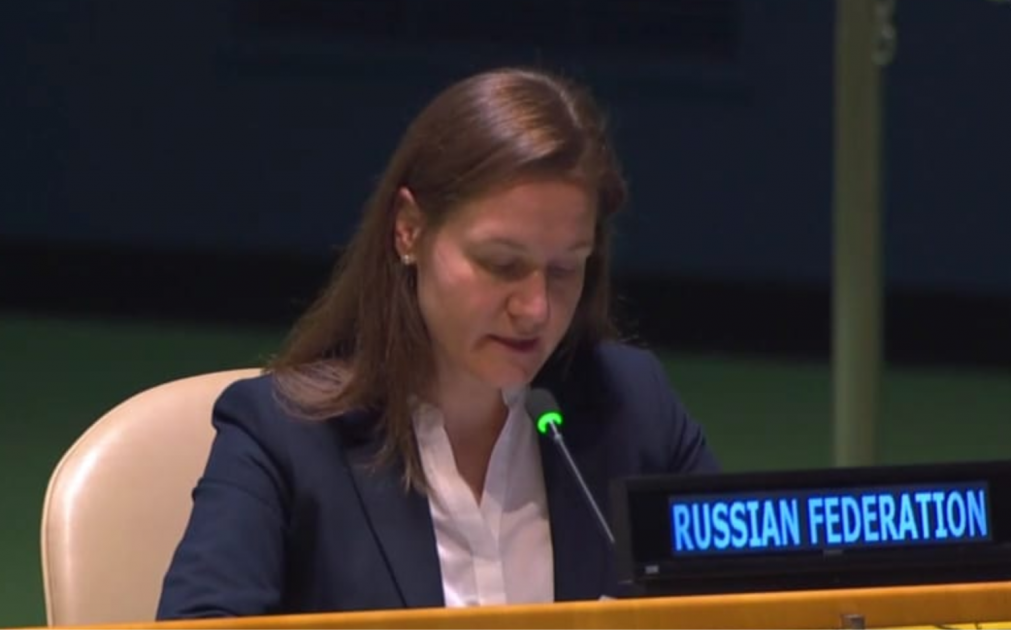Statement by the representative of the Russian Federation Natalia Karmazinskaya at the UNGA plenary meeting under agenda item 73 (a-c) “Strengthening of the coordination of humanitarian and disaster relief assistance of the United Nations, including special economic assistance”
Distinguished Mr. Chairman,
This year has become a serious test for the entire international community. The coronavirus pandemic and its long-term consequences for all spheres of people’s lives have demonstrated an urgent need for unity and solidarity of all Member States to confront the crisis and help the most vulnerable. In this regard we would like to begin our statement with the words of deep gratitude to humanitarian and medical workers, who, in the current difficult conditions, provide urgent humanitarian assistance to all those in need in the most remote corners of our planet.
I this context, we strongly condemn any attacks on humanitarian and medical personnel. Such actions only create more suffering and deprive the hope of salvation for those who are waiting for help.
Mr. Chairman,
The estimates of the UN Global Humanitarian Overview for 2021 are alarming. The number of those in need is growing rapidly (235 million people), record donor funding is required (35 billion US dollars). New challenges fall on the UN humanitarian response system. We are confident, that the tasks facing the world community can be solved only together and only in the atmosphere of mutual trust and respect. This is the main prerequisite of the “leaving no one behind” approach. Developing countries and countries in humanitarian emergencies face particular challenges amid the pandemic. Therefore, it is important to have a direct and open dialogue about the existing problems.
Mr. Chairman,
From our side we would like to touch upon two key issues in the context of humanitarian response.
Firstly, it is the importance of obtaining and using reliable data for assessing the needs and planning of humanitarian assistance, including those about attacks on medical and humanitarian facilities. Recently, we have seen the usage by humanitarian organizations of unverified sources of information, often located outside the territories of the affected States. We urge to preserve the impartial status of the UN, which is vital for the universal legitimacy of the work of its agencies.
Secondly, we are talking about the problem, often created by donors themselves. These are restrictions imposed bypassing the UN Security Council. In the context of pandemic they look even more inhumane. Unilateral sanctions obstruct the supply of humanitarian aid and essential medicines. Ms. Alena Douhan, Special Rapporteur on the negative impact of the unilateral coercive measures on the enjoyment of human rights, speaks about it with a weighty base of evidence, the UN Secretary-General calls for their lifting. So-called humanitarian exemptions simply do not work. Contractors refuse to implement humanitarian projects fearing to be included into the “black lists” of violators of sanctions regimes. The authors of these inhumane restrictions prefer not to notice this situation. They impose sanctions with one hand, and from the UN rostrum of the UN they call for respect of human rights and humanity. It’s time to heed the calls of the UN leadership and stop politicizing humanitarian and development assistance.
Mr. Chairman,
The Russian Federation has consistently advocated building up cooperation in the field of humanitarian aid under the auspices of the UN. We consistently make our contributions both through regular donor contributions to the budgets of the UN humanitarian agencies and by sending humanitarian aid and Russian rescuers to the regions with the most acute humanitarian needs. We are scaling up assistance to countries to support their efforts to combat the impact of the pandemic.
In 2020, the total amount of Russian funding through the UN humanitarian agencies amounted to more than 80 million US dollars. We contributed 1.5 million US dollars to the UN Central Emergency Response Fund, which we consider as a key operational mechanism for financing UN humanitarian activities.
Mr. Chairman,
Next year marks 30 years since the adoption of the UN GA resolution 46/182. It laid foundation for the work of the UN humanitarian agencies and their partners in the situations of complex emergencies and natural disasters. We are convinced that the UN Guiding principles of humanitarian assistance, which constitute its basis, are relevant to this day. We think it is important to confirm all together their inviolability.
Summing up, we would like to express our gratitude to the moderators of the negotiation processes on three humanitarian resolutions: the delegations of the EU, Sweden and Morocco (on behalf of the G77 and China). Although these documents have undergone only technical amendments, it is important that in current environment we adopt them by consensus, thereby reaffirming our unity and commitments to the noble goals of provision of humanitarian assistance to those in need.
I thank you.
